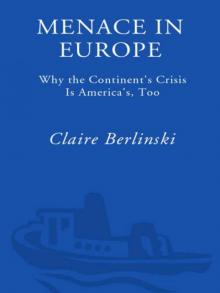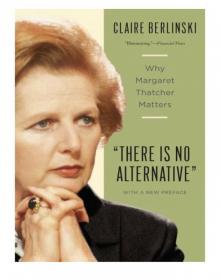- Home
- Claire Berlinski
Menace in Europe: Why the Continent's Crisis Is America's, Too
Menace in Europe: Why the Continent's Crisis Is America's, Too Read online
Table of Contents
Title Page
Dedication
Epigraph
CHAPTER 1 - EUROPE ON FIVE DOLLARS A DAY AND A FLAMETHROWER
THE RETURN OF THE REPRESSED
BLACKMAILED BY HISTORY
HOPELESSNESS AND THE VOID
IT’S OUR PROBLEM
CHAPTER 2 - SELF-EXTINGUISHING TOLERANCE
BARGAINING WITH DEPRAVITY
OH, UNBELIEVING FUNDAMENTALISTS: THE MURDER OF THEO VAN GOGH
THE NEW ORDERING PRINCIPLE OF EUROPEAN SOCIETY
THE NIHILIST ASSASSIN RETURNS
CHAPTER 3 - WHITE TEETH
THE SOCIOECONOMIC GROWTH MEDIUM
CHEERFUL MULTICULTURALISM: THE FICTION
THE CHEERLESS REALITY
“AN HONORARY WHITE MAN”
THE BITTER EXPERIENCE OF IMMIGRATION
ASSIMILATION IS DEATH
A DIET FOR THE SPIRITUALLY FLABBY
CORRUPTION, GHETTOIZATION, AND A PERVASIVE SENSE OF UNFAIRNESS
THE GREAT SATAN’S SECRET WEAPON
TOO MUCH BLOODY HISTORY
HOW TO RAISE A GOOD LITTLE EUROPEAN
WHY AMERICA SUCCEEDS WHERE BRITAIN FAILS
WHAT DOES THIS MEAN FOR US?
THE ANTI-AMERICANISM OF BRITISH INTELLECTUALS
CHAPTER 4 - THE HOPE OF MARSEILLE
MARSEILLE: THE EXCEPTIONAL CITY
“IN MARSEILLE WE GET ALONG”
LIKE NO OTHER CITY
MARSEILLE’S GIFT
A DELICATE BALANCE
CO-OPTING THE MODERATES: EUROPE’S ONLY HOPE
CHAPTER 5 - WE SURRENDER!
WHETTING THE ALLIGATOR’S APPETITE
CHAPTER 6 - NO PAST, NO FUTURE, NO WORRIES
“ITALIANS HAVE, YOU KNOW, BEEN AROUND FOREVER”
THE LOSS OF A VISION
ARE THE AXIS POWERS PUNISHING THEMSELVES?
CHAPTER 7 - BLACK-MARKET RELIGION: THE NINE LIVES OF JOSÉ BOVÉ
THE FIRST LIFE OF JOSÉ BOVÉ
THE DARK ANGEL OF THE ANTIGLOBALIZATION MOVEMENT
THE SECOND LIFE OF JOSÉ BOVÉ
THE MODERN PROPHET OF CROP WORSHIP
A PERENNIAL EUROPEAN PERSONALITY
THE THIRD LIFE OF JOSÉ BOVÉ
A FAMILIAR TASTE FOR VANDALISM AND VIOLENCE
THE FOURTH LIFE OF JOSÉ BOVÉ
RITUAL, RELATIONSHIP, FAMILY, LOVE, TRADITION
THE FIFTH LIFE OF JOSÉ BOVÉ
THE GREAT EUROPEAN AFFLICTION
THE SIXTH LIFE OF JOSÉ BOVÉ
BRINGING MEANING TO AN INDIFFERENT UNIVERSE
THE SEVENTH LIFE OF JOSÉ BOVÉ
THE EIGHTH LIFE OF JOSÉ BOVÉ
THE ENDURING LEGACY OF MEDIEVAL MILLENARIANISM
THE CLASSIC TROPE OF THE MILLENNIAL CULTS
MON DIEU
UTOPIA
CHAPTER 8 - BLACK-MARKET NATIONALISM: I HATE
INHERITORS OF THE GERMAN MUSICAL TRADITION
SPEAKING TO THE HEART
A FAMILIAR SCENE
JUST DOING WHAT COMES NATURALLY
“WHAT’S NATURALLY IN THE MUSIC IS WHAT MAKES IT SO GERMAN”
“THESE THINGS START BUBBLING UP”
POWER, PATHOLOGY, AND PAYBACK
SO HARD, SO DARK, SO EVIL
A NATION AT WAR WITH ITS FORBIDDEN IMPULSES
A LITTLE GAME
THAT IS NOT A LOVE SONG
NOT EUROPEAN—GERMAN
DOESN’T EVERY FAMILY HAVE ONE LIKE THAT?
THAT’S RIGHT, THE NAZI MANNER
THE PERSISTENCE OF NATIONAL PERSONALITY
CHAPTER 9 - TO HELL WITH EUROPE
THE THIN VENEER OF GAITY
REVERSION BY DEFAULT
A BLIND BALANCE OF POWER
THE LONG WITHDRAWING WHIMPER
AFTERWORD FOR THE PAPERBACK EDITION - I TOLD YOU SO
Acknowledgements
About the Author
NOTES
Copyright Page
For my grandmother . . . who has seen it all
I know that Europe’s wonderful, yet something seems to lack;
The Past is too much with her, and the people looking back.
—Henry Van Dyke
CHAPTER 1
EUROPE ON FIVE DOLLARS A DAY AND A FLAMETHROWER
I KEEP A SPIRAL-BOUND notebook on my desk filled with miscellaneous notes—the usual collection of ideas that seem insightful at three in the morning but substantially less so at daybreak, ideas that may well have been insightful but have been lost to posterity because my handwriting is indecipherable, scraps of overheard dialogue, observations made from the windows of trains.
One scrawled passage in particular stands out now. The date was July 3, 2005. “Within six months,” I wrote, “there will be another major terrorist attack or political assassination in Europe.” I am embarrassed to admit that my next thought, apparently, was that this would be inconvenient for me, since it would necessitate making major revisions to this book.
Three days later, Trafalgar Square erupted in celebration at the announcement that London would host the 2012 Olympics. The next morning, as the rush hour drew to a close, four suicide bombers detonated themselves in central London, killing 52 people and injuring 700 more. Papers with headlines from the previous evening had not yet been pushed off the newsstands: “Blimey! It’s London’s turn!” said one, and I can only imagine how those jolly words must have appeared to commuters staggering off the smoke-blackened London Tube.
Four more bombings were attempted on the London transport system two weeks later. This time, the bombs failed to detonate and the bombers survived, leaving behind forensic evidence that permitted police to ascertain their identities. Both the living and the dead bombers were British, born and raised—homegrown monsters who had not yet been apprised of the news that democracies don’t breed terrorists. Some were from comfortably affluent families. Some had been living handsomely for years on state benefits. It now appears that al Qaeda, which took credit for the attacks, recruited some of the bombers at a Muslim community center in Leeds—one funded by the British government and the European Union.1
It was revealed in the weeks following the attacks that quite a number of British Muslims do not much care for their fellow Britons. According to a poll conducted shortly after the bombing, a full 32 percent of British Muslims agreed that “Western society is decadent and immoral and Muslims should seek to bring it to an end.” Toward that goal, 1 percent—a seemingly small proportion until one considers that this comprises some 16,000 British Muslims—described themselves as willing, even eager, to embrace violence to destroy that society. According to the same poll, 6 percent of British Muslims saw the bombings as justified, 56 percent “understood why some people behave in that way,” and 16 percent felt “not loyal towards Britain.”2 This is not, of course, a problem limited to Britain: every European country is now home to large populations of alienated, unassimilated Muslims who despise the West.
As the portrait of the bombers became clearer, sharply illustrating these fissures in Europe’s social fabric, a large cohort of the professional commentariat proclaimed themselves shocked. I believe I heard the same people, several months later, proclaiming themselves shocked by the news that Kate Moss uses cocaine. Those of us who had been paying attention were not shocked at all.
This protest, for example, outside the U.S. embassy in London on May 20, 2005, was the kind of clue some of us had been noticing:
Shouting, “Down, down USA; down, down USA,” the protesters called for the killing of Americans, the death of t
he U.S. president, the death of British Prime Minister Tony Blair, the bombing of Britain, and the annihilation of the U.S. capital: “Nuke, nuke Washington; Nuke, nuke Washington! Bomb, bomb the Pentagon.” . . . “Death, death Tony Blair; death, death Tony Blair. Death, death George Bush,” the protesters chanted. . . . Holding their Qurans high, they called for death and mayhem, praising the destruction of New York’s twin towers on September 11, 2001, and saying the White House is next.3
I did not think these demonstrators were just joking then, and I certainly do not now.
The trend has been in evidence for years. British-based terrorists were involved in the planning and execution of the suicide bombing of American embassies in Kenya and Tanzania in 1998. They were involved in the planned attack on the American embassy in Albania. They were associated with the attempted attack on Los Angeles International Airport in 2000 and, most important, with the September 11 attacks on New York and Washington.
One week after the London bombings, it was reported that Mohammed Sidique Khan, believed to have been the operation’s field commander, had been in contact with a suspected recruiter for an extremist group in New York. Two other men linked to the plot had direct ties to the United States: one had traveled recently to Ohio; another had been a student at an American university.4
I have those same handwritten notes beside me now. On the evening of July 7, 2005, having spent the day following the news on the Internet and exchanging e-mails with my friends in London, I wrote these words: “The same thing will happen soon in the United States, and the bombers will come from Europe.” They will come from Europe because it is comparatively easy to enter the United States if you carry a European passport, and because Europe is—as it always has been—the breeding ground of the world’s most dangerous ideologues.
Although I take as much satisfaction as the next woman in being right, I’d much prefer to be wrong about this. Unfortunately, I don’t think I am.
THE RETURN OF THE REPRESSED
To judge from the number of books published in recent years about the challenges of renovating a farmhouse in Tuscany or Provence, large swaths of Europe are now populated by middle-aged American divorcées, living large on alimony and greatly occupied by the tending of their new olive terraces. As far as they are concerned, the chief problem with life in Europe is the difficulty of coaxing the medieval plumbing in their newly acquired Renaissance villas into action. (These women are survivors. They grow from this tough experience.)
Many Americans know this version of Europe—Alimony Europe, Fodor’s Europe, Europe on Five Dollars a Day—quite well. They know it from books and movies, they know it from their summer vacations. They remember backpacking through Europe after graduating from college. Amsterdam was great, until Flounder fell in the canal. They think wistfully of that ad in the back of the New York Review of Books: “Dordogne—18th-century stone manor. Antiques, all original beams, 18’ cathedral ceiling, fireplace, pool. 28 bucolic acres of woods, meadow, fruit and walnut trees, stream. Must be willing to feed goats.” When they visit Europe, they travel from one historic and lovely city center to another, making use of Europe’s convenient railroads. They do not visit the places most Europeans actually live, and know little about them.
Indeed, most Americans born after the Second World War have grown up thinking of Europe, Western Europe in particular, as not much more than a congeries of windmills, gondolas, dissipated monarchs, and peculiar toilets. They have considered the political and moral essence of Europe, when they have considered it at all, to be much like our own. They have, of course, heard the stories about the cancerous, deranged thing of the past, but that Europe, they believe, is long dead, vanquished by the United States in the First and Second World Wars, resurrected in our image through the Marshall Plan. Europe? It’s free, prosperous, peaceful, and democratic now, right? We don’t need to worry about it anymore.
Yes, Europe is peaceful, prosperous, free, and democratic, relatively speaking. It is not Sierra Leone, and I’m not saying it is. I do not propose we worry overmuch that German nationalists will hijack commercial jets and pilot them into our skyscrapers. American troops stationed in Italy may leave their bases without benefit of armored convoys, unworried about the threat of capture and beheading by enraged fundamentalist papists. All of that is true; it would be absurd to deny it. Europe’s achievements since the Second World War have been real and significant. There is unprecedented prosperity on the Continent, with standards of health care and education that in many places exceed those in the United States. The Great Powers of Europe are no longer cannibalizing one another. The Furor Teutonicus has for the moment subsided. No doubt, much of the darkness has been repressed.
But the repressed is known for returning.
Since the collapse of the Soviet empire, and particularly since September 11, some Americans have begun to sense, uneasily, a certain lack of love from our transatlantic brethren. Many Europeans did not seem to grasp the enormity of September 11, and never denounced the event as forthrightly as we had expected. The rift over the Iraq War exposed an extremity of anti-American passion that simply made no sense, particularly given that European intelligence agencies were, like ours, persuaded that Saddam Hussein was developing weapons of mass destruction, still more so because European cities would have been the obvious targets of those weapons. Iraq was, after all, believed to be building not long-range but medium-range ballistic missiles. To any European capable of reading a map, the implications of this should have been obvious. The spectacle of European leaders and citizens declaring themselves, in all seriousness, to be more alarmed by American imperialism than by Saddam’s quite rightly made many Americans wander to their bookshelves and begin thumbing through their copies of Let’s Go: Mexico.
The American political analyst Robert Kagan has suggested, reassuringly, that the divide is not as serious as it looks: it is just that Americans are from Mars, and Europeans are from Venus. Now, I am all for interplanetary diplomacy—who isn’t?—but having lived in Europe for most of my adult life, I see things just a little differently.
BLACKMAILED BY HISTORY
I use the word Europe here as a shorthand. I mean by this the former members of the European Community, a distinct historic entity comprising most of Western Europe and Great Britain. These nation-states are united now by their entangled pasts and their common dilemmas. I am writing about this Europe because it is the Europe I come from and the Europe I know; having never lived in Eastern Europe, I will leave that subject to someone who has.
I come from this Europe in the sense that my grandparents, musicians born in Leipzig, were refugees from the Nazis; they crossed every border in Europe from Danzig to Bilbao in their flight from Hitler’s armies. Their lives—and thus mine—were shaped by Europe’s history. I know this Europe because I have lived in it for many years, studied its languages and history in its universities, and worked in its economies; I have closely examined its legal and medical systems, its bureaucracies, its rental markets, and its tax codes—not so much out of academic curiosity but because for anyone living here, a close examination is inescapable. These are, therefore, personal stories.
They are unified, however, by two larger themes—and a set of questions.
The first theme is that Europeans are behaving now as Europeans have always behaved. Many seemingly novel developments in European politics and culture are in fact nothing new at all—they have ancient roots in Europe’s past. And what is that past? From the sack of Rome to the Yalta Conference, that past has been one of nearly uninterrupted war and savagery. Ethnic wars, class wars, revolutionary wars, religious wars, wars of ideology, and genocide are not aberrations in Europe’s history; they are its history. An interregnum from these ancient conflicts endured from 1945 to the end of the Cold War, when Europe’s destiny was in the hands of the two superpowers. With the collapse of the Soviet empire, however, history has reasserted itself. Those disturbing sounds you hear from Europe are its old,
familiar ghosts. They are rattling their chains.
The second theme is that this history has culminated in a peculiar, palpable European mood. Europeans, especially young Europeans, sense in their lives a cultural, spiritual, and ideological void, one that is evident in the art, the language, the literature of contemporary Europe; in the way they talk about their existence in cafés, in discotheques, and on the Internet; in their music, in their heroes, in their family lives; and above all in the way they face threats to their own civilization—and ours.
At the same time, Europe now confronts an entirely new set of questions, ones to which no European leaders or thinkers have offered a coherent answer, about the ultimate effects of European integration, changing demography, massive immigration from former European colonies, and the expectations to which the postwar welfare states have given rise. Without understanding this history, this mood, and these questions, there is no understanding Europe. Without understanding Europe, we cannot construct an intelligent relationship to it.
HOPELESSNESS AND THE VOID
Two historic events in particular are reverberating throughout Europe today. The first is the death of Christianity. From the time of Constantine’s conversion, Europe was above all a Christian continent, with every aspect of its political, social, and family life refracted through the prism of Christian faith. But Europe has in the past several centuries seen a complete— really complete—loss of belief in any form of religious faith, personal immortality, or salvation. In 2005, the death of Pope John Paul II occasioned profound, spontaneous grief, to be sure, but the emotion was an atavism: church attendance in most Western European countries is less than 5 percent, a statistic ultimately much more telling than the weeping crowds in St. Peter’s Square. For all the pope’s charisma, he was completely unable to persuade Europeans to return to the traditional beliefs and rituals that once defined them. The first draft of the new European Union constitution did not include a single mention of Christianity. Almost a third of the Dutch no longer know why Christmas is celebrated. When asked by pollsters to name an inspirational figure, British respondents placed Christ well below Britney Spears.

 Lion Eyes
Lion Eyes Menace in Europe: Why the Continent's Crisis Is America's, Too
Menace in Europe: Why the Continent's Crisis Is America's, Too Loose Lips
Loose Lips There is No Alternative
There is No Alternative